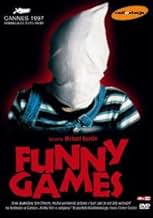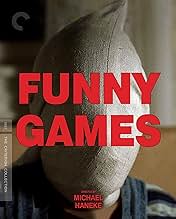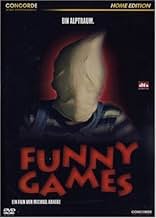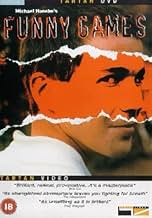Dois jovens violentos levam uma mãe, pai e filho como reféns em sua cabana de férias e os obrigam a jogar "jogos" sádicos para sua própria diversão.Dois jovens violentos levam uma mãe, pai e filho como reféns em sua cabana de férias e os obrigam a jogar "jogos" sádicos para sua própria diversão.Dois jovens violentos levam uma mãe, pai e filho como reféns em sua cabana de férias e os obrigam a jogar "jogos" sádicos para sua própria diversão.
- Prêmios
- 5 vitórias e 9 indicações no total
Avaliações em destaque
First things first, Michael Haneke HATES Quentin Tarantino's films. He hates the way violence and death are shown as being 'cool' - Cool gangsters executing their enemies whilst saying cool lines (And you will know, that my name is the Lord! etc,etc)with a cool song playing in the background. This is not how violence is in the real world, violence is a horrible fact of life, not a glamourous thing for youths to copy, and I think Haneke intended Funny Games to show it how it really is. I watched Funny Games without the slightest clue what the film was about, so I just had to sit back and take it as it comes. At first, I wasn't too impressed. I thought the scenes were too long and dragged out, yet at the same time, I felt a strange feeling of suspense. The incredibly long camera shots leave you that bored, that you think "Something bad is going to happen soon, I can tell...". The suspense also lasts right through the film 'til the very end. You don't want to watch it, but at the same time, you feel hypnotised by it.
I will not detail any events of the film, to save spoiling the atmosphere, but I will note one thing that people tend to be confused about:- "Why did the family let them into the house in the first place?" The two characters of Peter and Paul are let to walk all over the family because of one flaw in the bourgios psyche - 'The more polite a person is, the better a person they are.' This absurd way of thinking is played on by Peter and Paul and they obviously score, plus 'getting into the house without breaking in' is also one of their 'games'.For those who haven't seen the film, I definitely wouldn't recommend this for a night in with the parents/girlfriend, but I definitely would for people who want to see the difference between death and Tarantino-glam. Prepare for a highly suspenseful yet sickeningly violent, non-Hollywood, edge-of-the-seat piece of art. 8/10
I will not detail any events of the film, to save spoiling the atmosphere, but I will note one thing that people tend to be confused about:- "Why did the family let them into the house in the first place?" The two characters of Peter and Paul are let to walk all over the family because of one flaw in the bourgios psyche - 'The more polite a person is, the better a person they are.' This absurd way of thinking is played on by Peter and Paul and they obviously score, plus 'getting into the house without breaking in' is also one of their 'games'.For those who haven't seen the film, I definitely wouldn't recommend this for a night in with the parents/girlfriend, but I definitely would for people who want to see the difference between death and Tarantino-glam. Prepare for a highly suspenseful yet sickeningly violent, non-Hollywood, edge-of-the-seat piece of art. 8/10
I saw this movie again last night, for the third time, and once again had to keep watching each torturous minute until its chilling end. Going through the comments index, I see the expected responses: it was boring: it was pointless: it was too long: it's a satire: the games aren't actually that funny: it involved the audience in a neato way: it's nothing new: it's been done before. So I here offer an interpretation to add to the cacophany of reactions that FUNNY GAMES seem to engender.
What this movie reminds me of is the Book of Job, in the Bible, where God and Satan decide for their own amusement to torture this guy Job, killing his family, racking him with boils, and various other divine amusements. While watching this movie last night, I thought of another reference, this time from "King Lear": "Like flies to wanton schoolboys are we to the gods;/ They kill us for their sport." What this movie does is challenge the audience's own involvement in visual narrative -- usually, we watch movies from somewhere on-high and omniscient; we're invisible but we see all; we're voyeurs, just like God. In Haneke's film, we identify not with the victims but with the all-powerful killers as they set about their funny games. The two polite young men are performing their entertainments for us, the viewers; they're slaking our bloodthirst, our desire for gory spectacle - - after all, isn't this why we watch movies like this in the first place? Haneke, however, doesn't play the usual evasions; he makes explicit the audience's participation in violence; and he forces upon us the need to take responsibility for it.
I find this fascinating. I also find the negative comments here fascinating as well -- "not violent enough!" "the victims deserve to die..." "all the violence is off-screen..." "no gore at all, 'LAST HOUSE ON THE LEFT' did it first, with more blood...." etc. as being inadvertantly revealing of those viewers' psyche. I especially love the comment made by that one Viking guy, who writes that Haneke's film has "no point," and goes on to say "...I just hope those people break into MY house, so I can break them in two!"
I think Haneke made his point.
What this movie reminds me of is the Book of Job, in the Bible, where God and Satan decide for their own amusement to torture this guy Job, killing his family, racking him with boils, and various other divine amusements. While watching this movie last night, I thought of another reference, this time from "King Lear": "Like flies to wanton schoolboys are we to the gods;/ They kill us for their sport." What this movie does is challenge the audience's own involvement in visual narrative -- usually, we watch movies from somewhere on-high and omniscient; we're invisible but we see all; we're voyeurs, just like God. In Haneke's film, we identify not with the victims but with the all-powerful killers as they set about their funny games. The two polite young men are performing their entertainments for us, the viewers; they're slaking our bloodthirst, our desire for gory spectacle - - after all, isn't this why we watch movies like this in the first place? Haneke, however, doesn't play the usual evasions; he makes explicit the audience's participation in violence; and he forces upon us the need to take responsibility for it.
I find this fascinating. I also find the negative comments here fascinating as well -- "not violent enough!" "the victims deserve to die..." "all the violence is off-screen..." "no gore at all, 'LAST HOUSE ON THE LEFT' did it first, with more blood...." etc. as being inadvertantly revealing of those viewers' psyche. I especially love the comment made by that one Viking guy, who writes that Haneke's film has "no point," and goes on to say "...I just hope those people break into MY house, so I can break them in two!"
I think Haneke made his point.
I watched this year's remake of "Funny Games" prior to the original, simply because its sick-with-irony trailer got me extremely curious. Granted, this goes against my usual process of viewing a remake's precursor prior to the remake itself, but I couldn't help myself. By the end, I was astonished by writer-director Michael Haneke's audacity in telling a macabre home-invasion story devoid of Hollywood glamour, humor, and mercyremake or no, it's still one of the ballsiest exercises in visceral, reality-based horror ever released by a major studio.
So, when I decided to give the original "Funny Games" a spin (mere days after my viewing of American version), I was filled with presupposition toward how much I would appreciate the original (with the twists of Haneke's shot-for-shot remake still mapped out in my mind)similar to a sadistic "bet" our captors make with their prey, I was wondering if this earlier, German-language version would survive on its own terms. And, while each version is practically identical (save for some subtle nuances in the performances, the slightly varied location design, andof coursethe spoken language), both quite miraculously carry the same visceral, jaw-dropping sucker-punches as the other. Unlike the much-derided American remakes of "The Vanishing" and "Les Diaboliques," Haneke sees no need to let either culture off the hook, especially when each has its own prominent history of violence, on- and off-camera.
Ironically, the references to metalhead couch potatoes Beavis and Butt-Head probably seemed like an incendiary bitch-slap to the passive glamorization of American filmed violence in the 1997 version, but there is an even stronger sense of irony when the MTV-hosted duo are referenced in the remakeon the shores that birthed them, and the cult following of Generation Y-ers that has accumulated in the years since the show's cancellation (a sure sign that our passivity, if anything, is more pronounced now). It's subtle observations like this that give both versions of "Funny Games" an added resonance.
If anything takes some getting used to in the 1997 film, it's the general unfamiliarity of the cast. After seeing a collection of familiar performers run through Haneke's horrifying 2008 experiment, the German cast begins with a studied approach to the performances that eventually loosens into hysteria and desperation that is just as convincing as their remake counterparts. It is truly stunning how Haneke mines the same static framing and intense performances to ends that are equally effective in both films (even knowing the outcome of a protracted long take following a pivotal off-screen event, I found the experience just as emotionally agonizing to witness).
While it may seem hypocritical to "side" with Haneke (at least in the context his film creates), especially when I patronize (and am prone to enjoying) films that frequently downplay the reality of human suffering, the effect in both versions of "Funny Games" is undeniably powerfulthese are difficult, ugly, and emotionally draining films crafted with undeniable (and remarkably subtle) purpose. If there's any catharsis to be had from them, it will be in the introspection and assessment of your own attitudes toward violence.
So, when I decided to give the original "Funny Games" a spin (mere days after my viewing of American version), I was filled with presupposition toward how much I would appreciate the original (with the twists of Haneke's shot-for-shot remake still mapped out in my mind)similar to a sadistic "bet" our captors make with their prey, I was wondering if this earlier, German-language version would survive on its own terms. And, while each version is practically identical (save for some subtle nuances in the performances, the slightly varied location design, andof coursethe spoken language), both quite miraculously carry the same visceral, jaw-dropping sucker-punches as the other. Unlike the much-derided American remakes of "The Vanishing" and "Les Diaboliques," Haneke sees no need to let either culture off the hook, especially when each has its own prominent history of violence, on- and off-camera.
Ironically, the references to metalhead couch potatoes Beavis and Butt-Head probably seemed like an incendiary bitch-slap to the passive glamorization of American filmed violence in the 1997 version, but there is an even stronger sense of irony when the MTV-hosted duo are referenced in the remakeon the shores that birthed them, and the cult following of Generation Y-ers that has accumulated in the years since the show's cancellation (a sure sign that our passivity, if anything, is more pronounced now). It's subtle observations like this that give both versions of "Funny Games" an added resonance.
If anything takes some getting used to in the 1997 film, it's the general unfamiliarity of the cast. After seeing a collection of familiar performers run through Haneke's horrifying 2008 experiment, the German cast begins with a studied approach to the performances that eventually loosens into hysteria and desperation that is just as convincing as their remake counterparts. It is truly stunning how Haneke mines the same static framing and intense performances to ends that are equally effective in both films (even knowing the outcome of a protracted long take following a pivotal off-screen event, I found the experience just as emotionally agonizing to witness).
While it may seem hypocritical to "side" with Haneke (at least in the context his film creates), especially when I patronize (and am prone to enjoying) films that frequently downplay the reality of human suffering, the effect in both versions of "Funny Games" is undeniably powerfulthese are difficult, ugly, and emotionally draining films crafted with undeniable (and remarkably subtle) purpose. If there's any catharsis to be had from them, it will be in the introspection and assessment of your own attitudes toward violence.
10Flador
SPOILER: Okay... I just read most of the 144 user reviews.... Basically I wanted to make up my mind about this film, a film that is a very heavy load.
I've seen this movie 5 years ago, the good thing is most of the time you forget about (having seen) it but now and then you recall it. I can understand that many people hate this film, it is not nice to watch, the more when you see it in a theatre where the only chance to break its spell is leaving the theatre. Regardless if you leave or stay and watch it leave it beats you one way or the other. I fully agree with many other reviewers that I have no idea whom I should recommend it too. I am tempted to watch it a second time but didn't make it happen in 5 years.
Don't get me wrong. I think it is an excellent movie. It is also very disturbing and upsetting, I can't think of the right mood to watch it cause it'll take you down. And I think here is where the movie polarises. If, after watching, you find yourself deducting some message in the violence, and perhaps rethink violence - in both real life and movies - you will, well, also will have found some reason for this movies existence, if not - and it might be better if one does not - you will join in the 'crappiest movie ever chorus'.
I do however want to point out some achievement of this production:
*) The movie catches the audience in theatre. *) It does shock the audience but most of the violence is off-screen. You see more people dying in many fast-driven action movies. Only here you care. There is minor suspense, but I, personally, wouldn't put it into that category. (But then I am no horror/shocker/suspense fan and can easily err here) *) It's hard to compare it with any other movie (that I have seen). I am not sure if this is an achievement, but it's outstanding.
The reason I think Haneke made this movie. or, what I deducted from it is how far away violence and death are in our everyday lives today. While Hollywood - and other film productions serve them daily right in our living room, we hardly notice them anymore. Violence also sells movies, and we're meanwhile pretty used to that. Haneke also serves violence, and he dishes it next-door. He turns into a moral figure that asks the audience if they want more (after all me and you consume it every day) - and while HERE we want to say 'no please stop' he doesn't do our silent bidding. He pushes us down the drain, forcing us to deal with aspects of the violence we don't (want to) see. He even goes one step further. He offers us a 'good' ending, a payback that would make it easier for us to bear the movie, only to snatch it back and rip us of any cheerful emotion, telling us like 'no, sorry, here it doesn't work that way'.
I also read reviews mentioning the unsatisfying (often used, cliche) end. One more time Haneke manages to disappoint us, so far we were driven and didn't know what would happen, what to expect.
Only in the ending, we see it coming, and so it ends, obviously similar to many other movies. We're back standard movie stuff, the arc bent and the connection made.
"Funny games" is everything else but the title. Perhaps it refers to the funny games built on standard film violence in everyday movies. Perhaps it doesn't. Perhaps Haneke wants to stress that violence is a bad thing. Perhaps he's just sick.
One thing for sure, regardless if you like it, don't care, or hate it. You might have seen something somewhat like it, but nothing similar.
If you hate shockers, don't watch it. It will only be torture. If you love suspense, sorry, only very little gore here.
If you plan to watch it, calculate a few hours before you will manage to put your head to rest.
And don't watch it it personal crisis.
This movie will make you feel bad. If you watch it in a cinema, just look around. You're not alone with this feeling.
I've seen this movie 5 years ago, the good thing is most of the time you forget about (having seen) it but now and then you recall it. I can understand that many people hate this film, it is not nice to watch, the more when you see it in a theatre where the only chance to break its spell is leaving the theatre. Regardless if you leave or stay and watch it leave it beats you one way or the other. I fully agree with many other reviewers that I have no idea whom I should recommend it too. I am tempted to watch it a second time but didn't make it happen in 5 years.
Don't get me wrong. I think it is an excellent movie. It is also very disturbing and upsetting, I can't think of the right mood to watch it cause it'll take you down. And I think here is where the movie polarises. If, after watching, you find yourself deducting some message in the violence, and perhaps rethink violence - in both real life and movies - you will, well, also will have found some reason for this movies existence, if not - and it might be better if one does not - you will join in the 'crappiest movie ever chorus'.
I do however want to point out some achievement of this production:
*) The movie catches the audience in theatre. *) It does shock the audience but most of the violence is off-screen. You see more people dying in many fast-driven action movies. Only here you care. There is minor suspense, but I, personally, wouldn't put it into that category. (But then I am no horror/shocker/suspense fan and can easily err here) *) It's hard to compare it with any other movie (that I have seen). I am not sure if this is an achievement, but it's outstanding.
The reason I think Haneke made this movie. or, what I deducted from it is how far away violence and death are in our everyday lives today. While Hollywood - and other film productions serve them daily right in our living room, we hardly notice them anymore. Violence also sells movies, and we're meanwhile pretty used to that. Haneke also serves violence, and he dishes it next-door. He turns into a moral figure that asks the audience if they want more (after all me and you consume it every day) - and while HERE we want to say 'no please stop' he doesn't do our silent bidding. He pushes us down the drain, forcing us to deal with aspects of the violence we don't (want to) see. He even goes one step further. He offers us a 'good' ending, a payback that would make it easier for us to bear the movie, only to snatch it back and rip us of any cheerful emotion, telling us like 'no, sorry, here it doesn't work that way'.
I also read reviews mentioning the unsatisfying (often used, cliche) end. One more time Haneke manages to disappoint us, so far we were driven and didn't know what would happen, what to expect.
Only in the ending, we see it coming, and so it ends, obviously similar to many other movies. We're back standard movie stuff, the arc bent and the connection made.
"Funny games" is everything else but the title. Perhaps it refers to the funny games built on standard film violence in everyday movies. Perhaps it doesn't. Perhaps Haneke wants to stress that violence is a bad thing. Perhaps he's just sick.
One thing for sure, regardless if you like it, don't care, or hate it. You might have seen something somewhat like it, but nothing similar.
If you hate shockers, don't watch it. It will only be torture. If you love suspense, sorry, only very little gore here.
If you plan to watch it, calculate a few hours before you will manage to put your head to rest.
And don't watch it it personal crisis.
This movie will make you feel bad. If you watch it in a cinema, just look around. You're not alone with this feeling.
A pair of polite, bland-ish German teenagers encounter a woman, her husband and son in a remote lakeside cottage, then spend the night terrorizing them with "funny games." The set-up is identical to that of Elia Kazan's THE VISITORS, both versions of DESPERATE HOURS, and many other claustrophobic thrillers; but the feeling of the picture is that of a hundred-minute-long extended dance remix of the ear-slicing in RESERVOIR DOGS. The writer-director Michael Haneke has one ace up his sleeve: the handsomer of the two sociopaths is given asides to the camera, on the order of, "You are on their side, aren't you?"
The point of all this, apparently, is that the audience is implicated in the action, because we, as pop-culture consumers, consume torture and protracted murder as entertainment. But there's a flaw in Haneke's logic: the only time we consume torture and protracted murder as entertainment is in recondite European art films like I STAND ALONE, MAN BITES DOG, and FUNNY GAMES.
This is the kind of picture that gets bluenose types all huffy, and prone to pronouncements on the order of, "This is the most repellent movie ever made!" I'll stay off that high horse--but I will say, a few hours after seeing the picture, that there is something singularly loathsome in the hypocrisy of Haneke's coating a suspenseless piece of fictional snuff porn in the sanctimony of its being a Statement on Violence and Media. Haneke makes the victims as dull and uncharacterized as the victors; removes just about any plausible means of escape or table-turning; and subtracts any reason for us to care about the outcome, except our desire not to witness hideous suffering. What's left--an orgy of S&M-like abuse--certainly does make the audience squirm. But so what? So would a videotape of anonymous torture, or the capture and abuse of an animal. FUNNY GAMES doesn't exist on a political or philosophical level (like I STAND ALONE); its attempts at mordant humor are collegiate (unlike MAN BITES DOG); it certainly doesn't hold up a mirror to a junk-food culture (like NATURAL BORN KILLERS). It's a wallow. And you know what side the filmmakers are on when one of the sadists terrifies a little kid by slipping on a CD in a neighbor's house the kid has escaped to, and the music is that well-known favorite of middle-aged bourgeois people on vacation...John Zorn and the Naked City.
This kind of Extreme Cinema has worked much better when practiced by artists in totally disreputable sub-pulp forms--like Lucio Fulci and Ruggero Deodato, whose sometimes almost unwatchable films engage in a spiritual wrestling match between the desire to go to the limits, and the conscience that watches over the mayhem. I was shocked to discover that Haneke is nearly sixty--this picture has the sensibility of a kid turned on by the autopsy pictures at Amok Books. As he sticks bamboo under our fingernails, your mind is so unoccupied it asks other questions. Like: Why would any sane family entertain for a minute two young strangers wearing fingerprint-proof gloves in the middle of summer? And: Is the actress playing the mother this terrible because no one else would take such a degrading role?
The point of all this, apparently, is that the audience is implicated in the action, because we, as pop-culture consumers, consume torture and protracted murder as entertainment. But there's a flaw in Haneke's logic: the only time we consume torture and protracted murder as entertainment is in recondite European art films like I STAND ALONE, MAN BITES DOG, and FUNNY GAMES.
This is the kind of picture that gets bluenose types all huffy, and prone to pronouncements on the order of, "This is the most repellent movie ever made!" I'll stay off that high horse--but I will say, a few hours after seeing the picture, that there is something singularly loathsome in the hypocrisy of Haneke's coating a suspenseless piece of fictional snuff porn in the sanctimony of its being a Statement on Violence and Media. Haneke makes the victims as dull and uncharacterized as the victors; removes just about any plausible means of escape or table-turning; and subtracts any reason for us to care about the outcome, except our desire not to witness hideous suffering. What's left--an orgy of S&M-like abuse--certainly does make the audience squirm. But so what? So would a videotape of anonymous torture, or the capture and abuse of an animal. FUNNY GAMES doesn't exist on a political or philosophical level (like I STAND ALONE); its attempts at mordant humor are collegiate (unlike MAN BITES DOG); it certainly doesn't hold up a mirror to a junk-food culture (like NATURAL BORN KILLERS). It's a wallow. And you know what side the filmmakers are on when one of the sadists terrifies a little kid by slipping on a CD in a neighbor's house the kid has escaped to, and the music is that well-known favorite of middle-aged bourgeois people on vacation...John Zorn and the Naked City.
This kind of Extreme Cinema has worked much better when practiced by artists in totally disreputable sub-pulp forms--like Lucio Fulci and Ruggero Deodato, whose sometimes almost unwatchable films engage in a spiritual wrestling match between the desire to go to the limits, and the conscience that watches over the mayhem. I was shocked to discover that Haneke is nearly sixty--this picture has the sensibility of a kid turned on by the autopsy pictures at Amok Books. As he sticks bamboo under our fingernails, your mind is so unoccupied it asks other questions. Like: Why would any sane family entertain for a minute two young strangers wearing fingerprint-proof gloves in the middle of summer? And: Is the actress playing the mother this terrible because no one else would take such a degrading role?
Você sabia?
- CuriosidadesUlrich Mühe and Susanne Lothar, who play the father and mother, were a couple in real life from this movie until Mühe's death in 2007.
- Erros de gravaçãoWhen Anna and Georg are driving in their car, the reflection of a microphone between the front seats can be seen on the window.
- Cenas durante ou pós-créditosThe front credits list "music by" several classical composers and John Zorn. Given the director's outspoken views on modern media, including the "composer" of the hardcore "thrash metal" songs alongside the likes of Handel and Mozart is part of his message.
- ConexõesFeatured in The Last Days of the Board (1999)
- Trilhas sonorasCara Salva
from 'Atalanta'
Music by George Frideric Handel (as G.F. Händel)
Sung by Beniamino Gigli
Published by EMI DA 1918
Principais escolhas
Faça login para avaliar e ver a lista de recomendações personalizadas
- How long is Funny Games?Fornecido pela Alexa
Detalhes
- Data de lançamento
- País de origem
- Central de atendimento oficial
- Idiomas
- Também conhecido como
- Juegos divertidos
- Locações de filme
- Empresas de produção
- Consulte mais créditos da empresa na IMDbPro
Bilheteria
- Faturamento bruto mundial
- US$ 1.266
- Tempo de duração1 hora 48 minutos
- Cor
- Mixagem de som
- Proporção
- 1.85 : 1
Contribua para esta página
Sugerir uma alteração ou adicionar conteúdo ausente




























